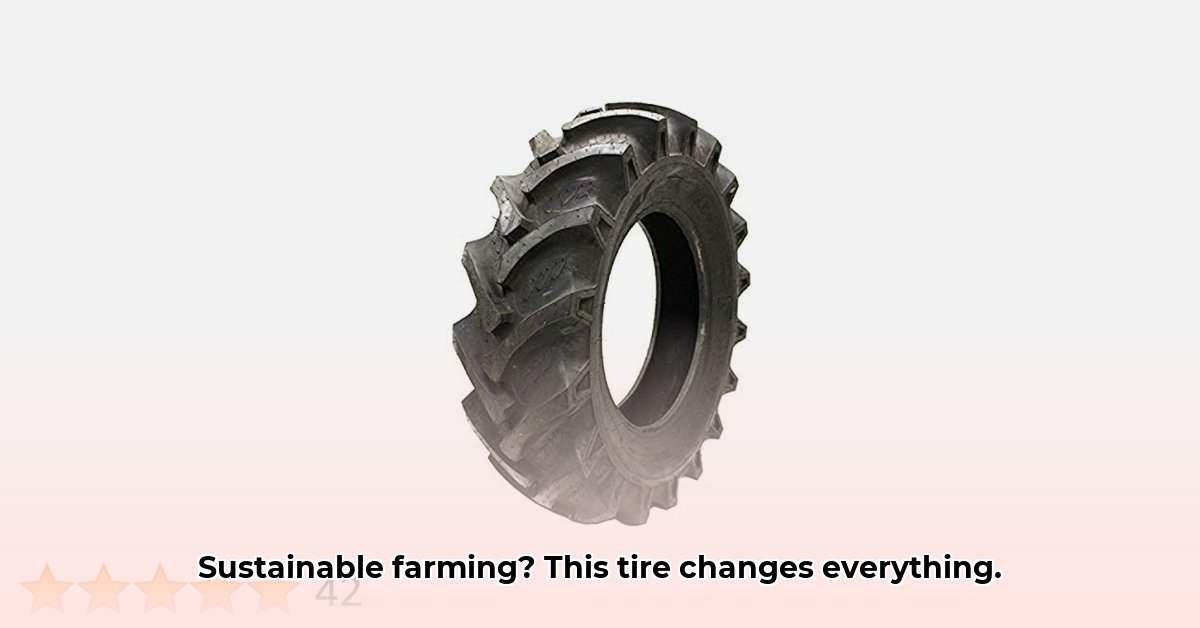
BKT TR 171 8.3-22 Tractor Tire Review: A Sustainability Assessment
Choosing the right tractor tire significantly impacts farm sustainability and profitability. This review analyzes the BKT TR 171 8.3-22 tire, focusing on its suitability for eco-friendly farming. We'll examine its performance, assess its sustainability claims, and offer actionable recommendations for farmers, BKT, and policymakers. For more information on tractor tire sizes, see this helpful resource.
Sizing Up the BKT TR 171: Specs and Performance Claims
The BKT TR 171 8.3-22 boasts standard specifications readily available: dimensions, ply rating, and recommended inflation pressure. However, crucial lifecycle data remains scarce. Understanding its lifespan, material composition, and disposal methods is essential for a complete sustainability assessment.
Pros:
- Robust Construction: Suggests extended lifespan, reducing the need for frequent replacements. This contributes to lower long-term costs and less waste.
- Deep Tread Pattern: Advertised to improve traction and potentially minimize soil compaction. However, independent verification is lacking.
- Potential for Fuel Efficiency: Improved traction can lead to fuel savings – a significant factor in reducing the environmental footprint of farming operations.
Cons:
- Lack of Lifecycle Assessment (LCA) Data: The absence of publicly available lifecycle data significantly hinders a full sustainability assessment. Without this information, it is impossible to determine the overall environmental impact.
- Limited Material Sourcing Information: The lack of transparency regarding the sourcing of raw materials limits the sustainability assessment. Are materials sustainably sourced, or are there environmental concerns associated with their extraction and processing?
- Uncertainty Regarding End-of-Life Management: The lack of information on end-of-life management raises questions regarding recyclability and potential environmental impact of disposal.
Rating: Due to the limited available data, a definitive star rating is premature. A comprehensive lifecycle assessment and independent verification of performance claims are needed before a complete evaluation can be conducted.
Beyond the Specs: The Sustainability Puzzle
Sustainable farming demands a holistic approach, encompassing all stages of a product’s lifecycle. The BKT TR 171's journey—from raw material extraction to disposal—requires scrutiny:
Manufacturing Materials and Carbon Footprint
What materials constitute the BKT TR 171? Are they sustainably sourced? The manufacturing processes themselves significantly impact the environment. Transparency regarding energy consumption, water usage, and greenhouse gas emissions is crucial for assessing the tire's carbon footprint. Without this data, claims of sustainability are unverifiable.
End-of-Life Management: A Critical Unsolved Question
What happens to the tire at the end of its useful life? Is it easily recyclable? Responsible disposal is fundamental to sustainable agriculture. A tire ending up in a landfill is environmentally unacceptable. Clear and readily available information regarding end-of-life management options is urgently needed.
Actionable Steps: A Call for Transparency and Collaboration
Addressing the information gap requires a collaborative effort from all stakeholders:
1. For Farmers and Agribusinesses:
- Compare the BKT TR 171's performance with alternative 8.3-22 tires, using independent data and field tests.
- Track fuel consumption, measure soil compaction, and assess the tire's lifespan to ascertain cost-effectiveness and long-term environmental impact.
2. For BKT:
- Publicly release a comprehensive LCA for the TR 171, detailing every stage of its life cycle.
- Disclose material sourcing practices, focusing on sustainability and ethical operations.
- Develop and implement robust end-of-life management and recycling programs.
3. For Policymakers:
- Establish stricter regulations for environmental impact reporting of agricultural equipment.
- Incentivize the adoption of sustainable farming technologies, including eco-friendly tires.
Assessing Risks and Mitigating Uncertainties
Several risk factors need consideration:
| Risk Factor | Likelihood | Impact | Mitigation |
|---|---|---|---|
| Insufficient Lifecycle Data | High | High | Independent research, mandatory LCA reporting, pressure advocacy groups for transparency. |
| Unverified Compaction Claims | Medium | Medium | Independent field testing, comparison studies with competing tire brands, peer-reviewed studies. |
| Supply Chain Transparency Issues | Medium | Medium | Mandatory supply chain transparency reporting, third-party audits of sourcing practices. |
Conclusion: Towards Sustainable Agricultural Practices
The BKT TR 171 8.3-22 demonstrates potential benefits, but its true sustainability impact remains uncertain due to a lack of transparent data. Improved transparency, data-driven decisions, and collaborative action are pivotal for a sustainable future in agriculture. Only with a complete understanding of a product’s entire life cycle can we make informed choices that benefit both farmers and the environment.